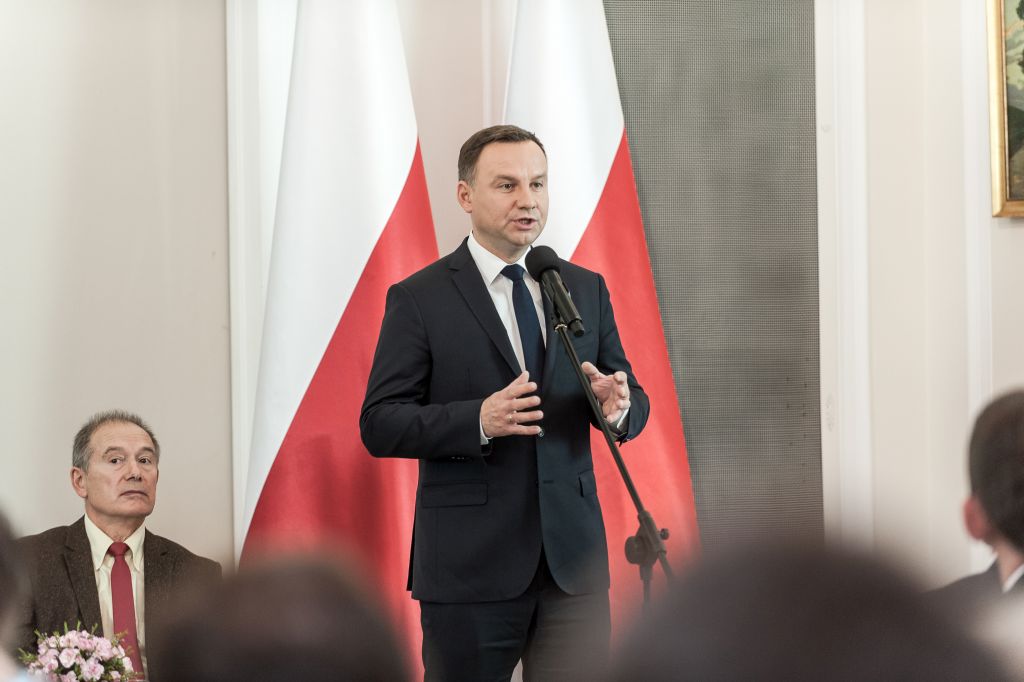Polish Operation of the NKVD 1937-1938. Restoring the memory of the crime
The Centre together with the Chancellery of the President of the Republic of Poland and the Institute of National Remembrance organized an international conference Polish Operation of the NKVD 1937-1938. Restoring the memory of the crime More than forty historians and experts from Poland, Russia, Belarus, Ukraine, and the USA were invited to participate in the event. The conference is another step in restoring a proper place in consciousness and social memory of those crimes among the Polish nation.
The opening session was attended by the President of the Republic of Poland, Andrzej Duda, the director of the Centre of Polish-Russian Dialogue and Understanding, Ernest Wyciszkiewicz, and the president of the Institute of National Remembrance, Dr. Jarosław Szarek.
- Tylko na prawdzie, wyciągając wnioski nawet z najbardziej dramatycznych momentów naszej historii, jesteśmy w stanie zbudować na przyszłość dobre relacje - powiedział prezydent Andrzej Duda. Jak zaznaczył prezydent, wszystko co spotkało Polaków ze strony Związku Sowieckiego, doprowadziło "do śmierci setek tysięcy, milionów naszych rodaków, do cierpienia, zniszczenia rodzin, zniszczenia w dużym stopniu polskiej kultury, która tam była".
Wystąpienie Prezydenta Rzeczypospolitej Polskiej Andrzeja Dudy
Выступление Президента Республики Польша Анджея Дуды
The director of the Centre for Polish-Russian Dialogue and Understanding, Ernest Wyciszkiewicz, stressed that truth cannot be negotiated and should not stand in the way of agreement. Truth allows one to be freed from hypocrisies and prejudices, and enables the reconciliation process to happen. The director of the Centre reminded that aiming to unveil the truth about the past, the Centre created a reconstruction of the so-called Belarusian Katyn list – one of the largest and last secrets of the Katyn massacre. This list refers to at least 3,870 Polish citizens murdered in 1940 by the NKVD in the territory of Soviet Belarus.
The President of the Institute of National Remembrance (further – IPN), Jarosław Szarek, pointed out that reminding of the NKVD crime committed on Poles in 1937-1938 is part of the IPN mission. "The Institute of National Remembrance had no doubts that 2017 must be the year when the memory of the Polish Operation is restored," said Szarek, pointing out that the IPN had taken many initiatives in this matter, in particular: the IPN prosecutors were conducting an investigation on this matter, the IPN issued a selection of documents Wielki Terror w sowieckiej Gruzji. Represje wobec Polaków [The Great Terror in Soviet Georgia, Repressions against Poles], and especially – as Szarek stressed – IPN organized courses for about 2,000 teachers from all over Poland.
„Operacja polska” NKWD 1937-1938. 80 lat po sowieckiej zbrodni
«Польская операция» НКВД 1937-1938. 80 лет после советского преступления
On the second day of the Polish Operation of the NKVD 1937-38 conference, a commemorative stamp was presented. "We live in a world where the image speaks more than a word, which is why the 30 million copies of the stamp are so important," said the IPN president Jarosław Szarek. The stamps would soon be delivered to post offices, as he added.
During the conference, participants addressed the subject of the Polish Operation of the NKVD in the Polish and international context, discussed the group, regional and individual crime dimension. During the event, the speakers talked about the Belarusian, Georgian, German and Ukrainian victims of the Polish Operation. Projects commemorating the victims of the NKVD crimes were also presented at the conference.
Conference program available for download: Polish Operation NKVD 1937-1938
Other activities to restore the memory of the Polish Operation
An educational portal www.operacja-polska.pl was created thanks to the efforts of the Centre and the Institute of National Remembrance, there can be found information about NKVD’s Polish Operation, as wells as an educational film, the schedule of the crime, places of executions and burials of the victims.
In addition, the Centre created a database of victims of anti-Polish terror - www.ofiaryterroru.pl. The database is primarily a source for the living family members and relatives of the victims, and the information collected can be helpful in conducting genealogy searches.

